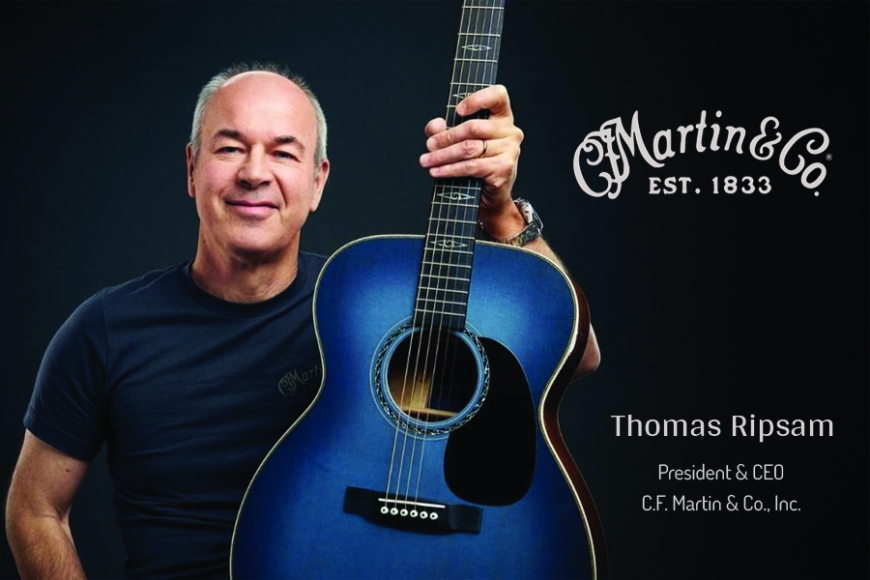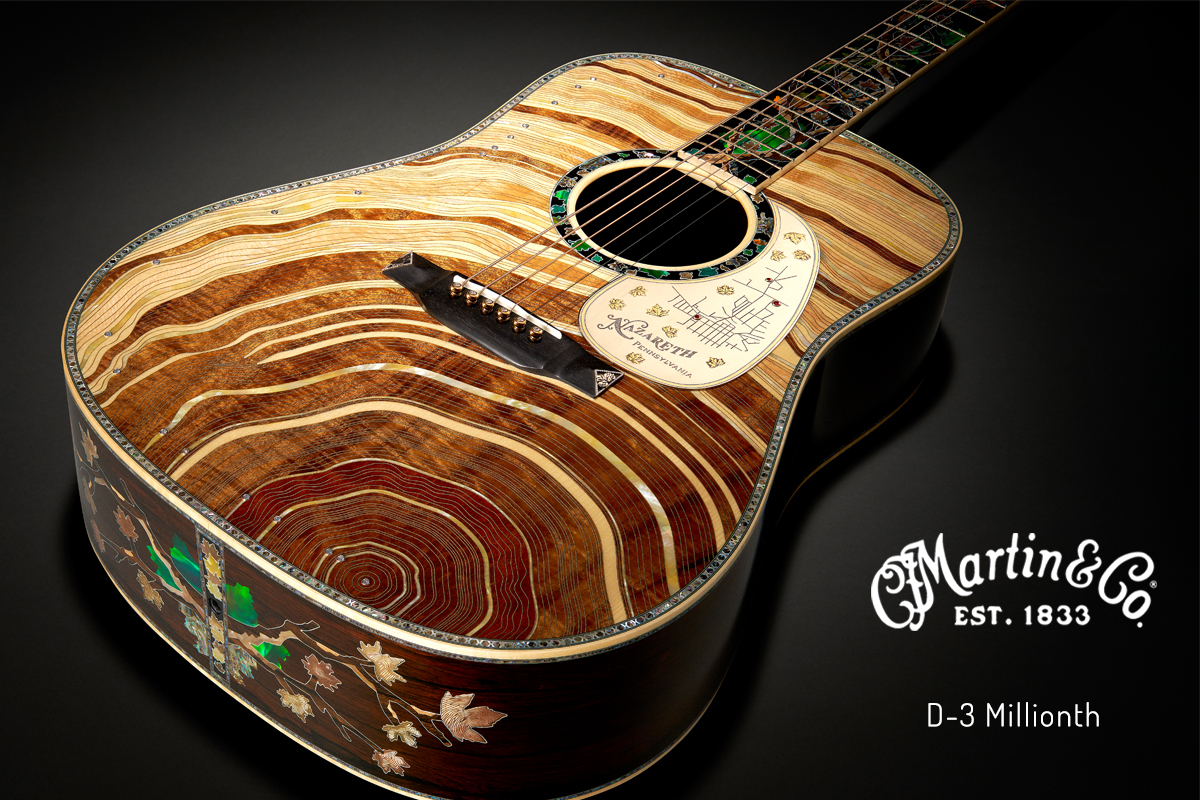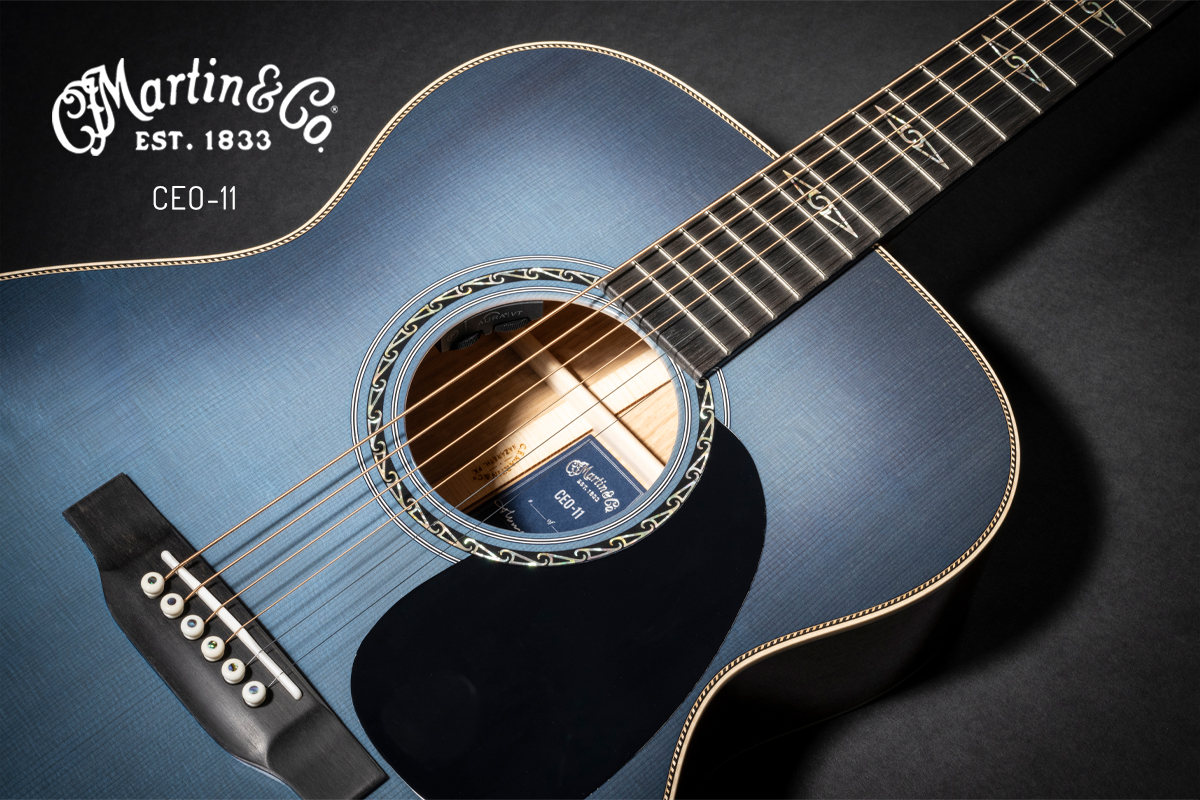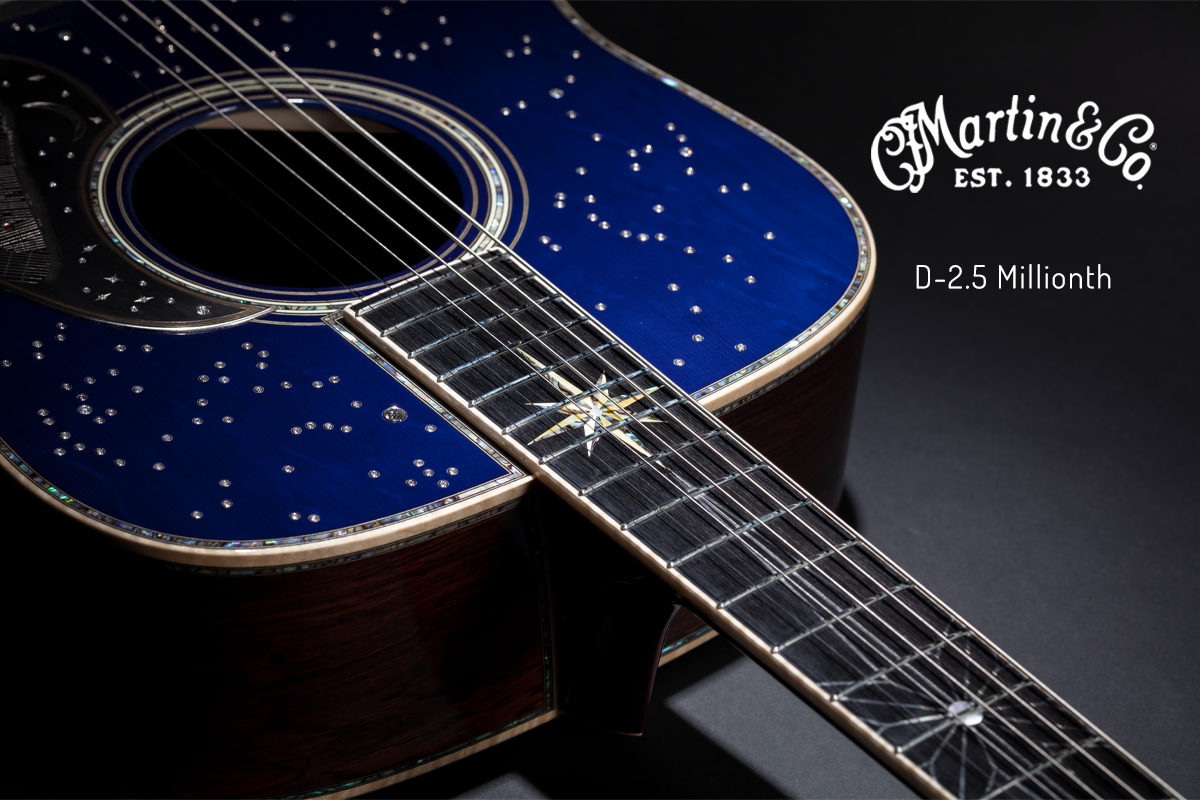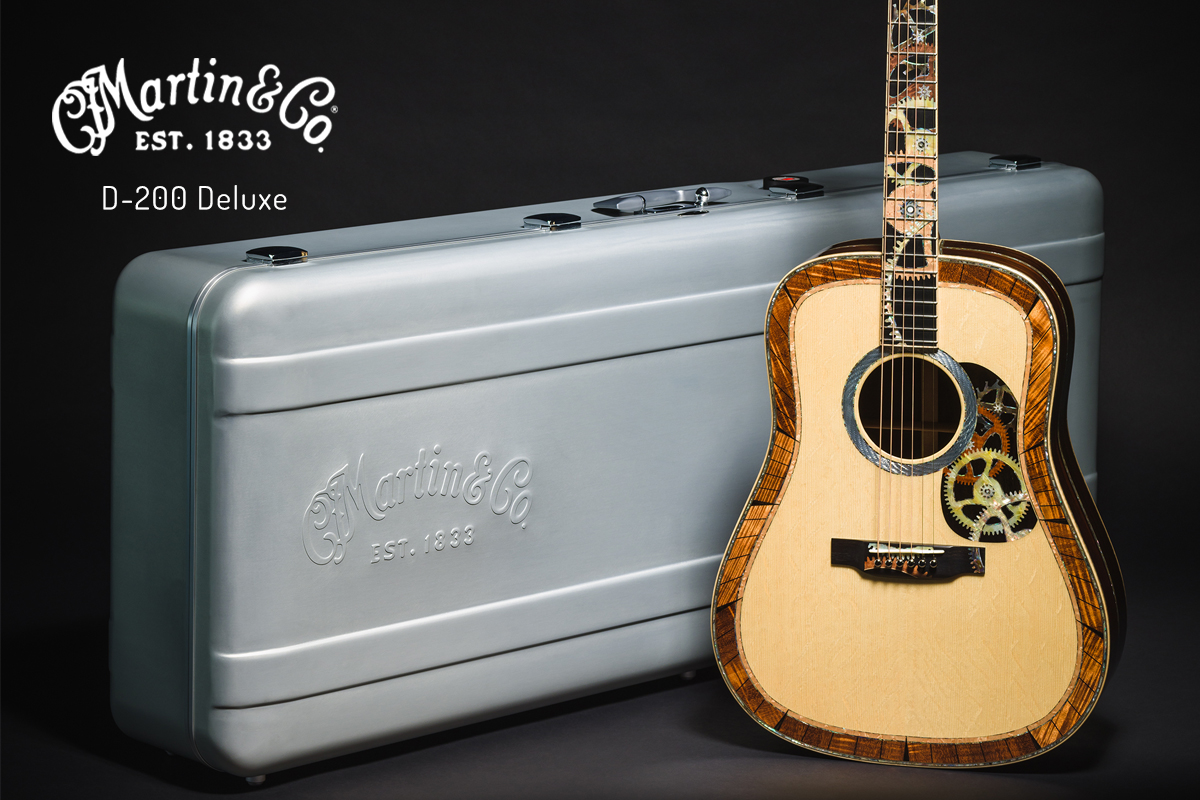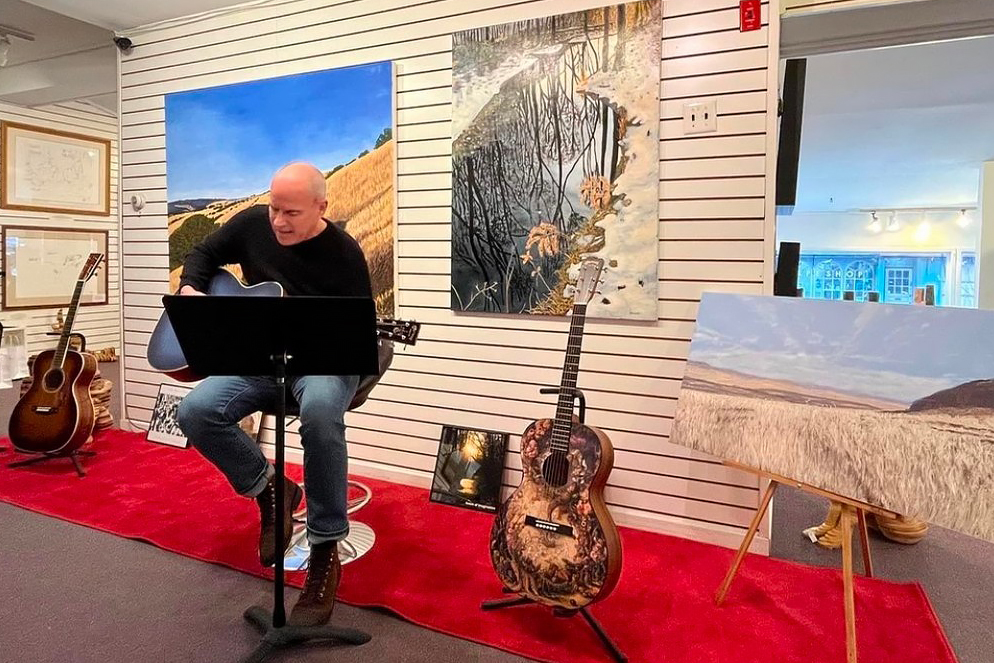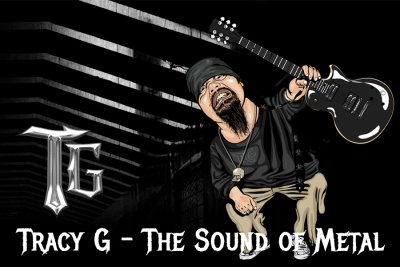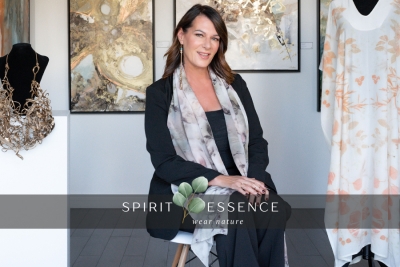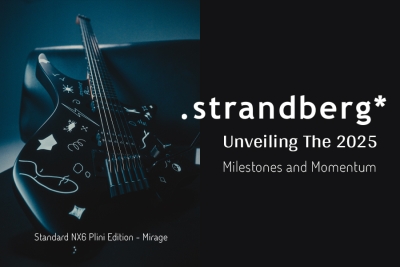In this exclusive interview, we speak with Thomas Ripsam about Martin Guitar’s latest innovations and the vision behind them. From the story behind the historic D-3 Millionth model and the collaboration with artists like Julie Heffernan and Robert Goetzl, to the role Martin plays in education, philanthropy, and an evolving music industry — Ripsam shares insights into how a legacy brand stays relevant in an age of streaming, AI, and global change. This is more than just a conversation about guitars—it’s a look at the soul of music itself.
Thomas Ripsam:
Our purpose, our brand, it is all about unleashing the artist within. And so there are various forms how you can do that.
We do believe that art and music are very closely intertwined.
Gene Aaron: At the 2025 NAMM Show, Martin Guitar presented a special D-3 Millionth model, marking the 3 millionth serialized Martin guitar. What can you tell us about the story behind this model and how it became such a major milestone?
Thomas Ripsam: Martin Guitars has a history of celebrating milestones and, one type of milestone that we love to celebrate is, when we hit a certain number of what we called serialized guitars, and, yeah, this year we're going to hit our 3,000,000th milestone, which means we will have produced 3 million serialized guitars. And for each of these guitars, we think about a theme that we want to express with the guitar. Two and a half years ago, we celebrated our 2.5 millionth serialized guitar. So this is the 3 millionth.
As you know, our company name is C.F. Martin & Co., and the theme for this guitar was focused on what does “& Co.” really mean. And then “Co” in this context was really about the people who have touched Martin Guitar — the company throughout its 192 year history.
And so the guitar itself has various features that express the impact of the people. One is, you have on the top of the guitar, these growth rings like from a real tree. And this is based on a real sycamore tree. You have 192 rings, growth rings that basically show the history of the company.
But then we have on the back of the guitar the sycamore tree design since Martin Guitar is based in the street called Sycamore Street. And so the sycamore tree is special to us. And so we use the sycamore tree and the branches and the leaves to express people who have been part of the company's history.
And if you look at the guitar, there are even fingerprints of real Martin coworkers that are inlaid into the guitar. So this is an example of the theme and what we wanted to express, and that's what this guitar is all about. It took a year and a half to complete. It was such a big project, lots of people involved, including some of our partners.
And we were so excited to roll this out at NAMM, we actually made three of these guitars. One will be for our museum, two will be for sale.
 D-3 Millionth
D-3 Millionth
D-3 Millionth
D-3 Millionth
 D-3 Millionth back
D-3 Millionth back
D-3 Millionth back
D-3 Millionth back
 D-3 Millionth top
D-3 Millionth top
D-3 Millionth top
D-3 Millionth top
 D-3 Millionth sides
D-3 Millionth sides
D-3 Millionth sides
D-3 Millionth sides
 D-3 Millionth sides headstock
D-3 Millionth sides headstock
D-3 Millionth sides headstock
D-3 Millionth sides headstock
 D-3 Millionth fretboard
D-3 Millionth fretboard
D-3 Millionth fretboard
D-3 Millionth fretboard
 D-3 Millionth pickguard Nazareth, PA
D-3 Millionth pickguard Nazareth, PA
D-3 Millionth pickguard Nazareth, PA
D-3 Millionth pickguard Nazareth, PA
 D-3 Millionth heal and binding
D-3 Millionth heal and binding
D-3 Millionth heal and binding
D-3 Millionth heal and binding
 D-3 Millionth Certificate of Authenticity
D-3 Millionth Certificate of Authenticity
View the embedded image gallery online at:
Images courtesy of C.F. Martin & Co., Inc
D-3 Millionth Certificate of Authenticity
D-3 Millionth Certificate of Authenticity
View the embedded image gallery online at:
Images courtesy of C.F. Martin & Co., Inc
https://suleyera.com/music-life/gear-studio/martin-guitar-thomas-ripsam.html#sigProId96628b3d15
Gene Aaron: This guitar is really beautiful. I only saw it in a picture, but surely you can imagine how beautiful it is — a piece of real art. And speaking about art, you have also introduced the Art Series with 00L Oliver and D-Robert Goetzl 10, which you did in collaboration with great artists — Julie Heffernan and Robert Goetzl.
So how do you feel their work transcends and resonates with the sound of Martin and how is it done in the sense of collaboration between the artist and the Martin Guitar luthiers who work on these projects?
Thomas Ripsam: I think for us, our purpose, our brand, it is all about unleashing the artist within. And so there are various forms how you can do that. But we do believe that, you know, art and music are very closely intertwined. And of course, when you look at a guitar, there's the sound, there's the playability. But with Martin guitars, what's also important is the esthetics. The visual artistry that we bring out with our guitars. And so, Martin has a history of working with artists, various artists who contribute to guitars.
You mentioned Robert Goetzl, who has probably done at least ten different guitars with us. And some of these guitars are hand-painted, like the one with the hummingbird that we announced at the most recent NAMM show. For some, he contributes the art, but then the images are printed on the tops, like, for example, the Biosphere® guitar that we also rolled out with a whale theme and with the coral reef.
So there are two of those guitars, and one with Julie Heffernan. I connected with Julie because I saw some of her imagery used on some electric guitars by a different company. And so I connected with her, and I was just blown away by her artistry. And we talked and decided, let's do something together.
And then it became a collaborative effort. You know, her ideas, our ideas. And that created the 00L Oliver! It's called Oliver because she dedicated this guitar to her son, whose name is Oliver. But what's beautiful, I think about this guitar is one of her paintings. She picked one of her paintings as the image for use on the top of the guitar. So you can actually see the image constantly. Whereas on the electric guitars, it was on the back of the guitar. So you wouldn't really see the image that often.
So we love to work with artists. Sometimes they approach us, sometimes we approach them. But in all these cases, it becomes a highly collaborative effort, and we think it's something natural to do.
View the embedded image gallery online at:
Images courtesy of C.F. Martin & Co., Inc
https://suleyera.com/music-life/gear-studio/martin-guitar-thomas-ripsam.html#sigProIdf8a5154e07
Gene Aaron: And that shows and explains maybe, your collaboration with Arete Gallery where you paid a visit recently to greet the community and meet with the people, local people in your area.
Thomas Ripsam: That's correct. You know, besides my love for guitars, I also love to paint. So I'm a painter myself and create art through that medium. It is a gallery in New Hope (PA), and they have a series that is called Healing through Creativity. And, as you know, we work with one of the owners from Arete Gallery as Martin Guitar. And so it was an opportunity for me to show some of the guitars that I was actually involved in designing, to show my art, but also to talk more about the role that creativity and art have played in my life. And you know, the various passions I have and the ways in which I love to express them in my life.
Gene Aaron: I think it's really, really inspirational. It's really important that your company and yourself, of course, connect those two different arts together. And that is raising the value, raising the bar much higher.
Martin Guitar has a program called Martin Artist Showcase. How does it differentiate from conventional endorsement programs? How does it benefit both artists and your brand? And what do you look for in the artists when considering them for endorsements? How does that partnership help musicians to elevate their craft and your brand as well?
Thomas Ripsam: Absolutely. You know, I think if you look back at the history of Martin Guitars, there's a long history of Martin working with iconic artists. And we are very proud of that history. But, as you probably also know, the artist landscape has become more complicated, right? There are lots of artists out there. They're also influencers. And so we have various ways of how we collaborate with artists. But what triggered this idea about this Showcase Artist program was that we wanted to create a real program around how we celebrate, promote, and support artists.
And so we came up with this idea that every year we would basically announce a class of artists that we support, and they support us. And so it's a platform for promoting, celebrating, and supporting each other. And these artists that we just announced for the 2025 class are really great, great artists. And if you look at them, they cover a variety of genres. So that's really important for us that we don't just focus on a particular music genre, but we cover a wide variety of genres because that's how we think about the audience in terms of people that are playing Martins or should play Martins.
The Martin CEO-11 - designed by President and CEO Thomas Ripsam
Image courtesy of C.F. Martin & Co., Inc
Image courtesy of C.F. Martin & Co., Inc
All of the artists that we work with have a significant following. They have a significant level of accomplishment for what they do. You know, some of these artists are Grammy-nominated, some of them work with various labels. And so there's a certain level of establishment that we are looking for in these artists.
But we are also looking for variety, right? Because for us, back to what I mentioned earlier and listing the artists within, that's what we are all about. And we know there's not just one guitar, not just one artist that inspires us and our players. Usually, it's a spectrum of different instruments and different artists.
And so that's what the showcase program is. We don't pay artists. That's maybe also one thing that we often highlight. We like to work with artists who have a genuine interest in playing Martin guitars and being connected with Martin. And we love the relationship aspect of it.
And we announced these classes, but for us, it's a connection for life, and being part of the Martin family means something. If you think about the history, some of the artists that we have and continue to work with, and now we are adding to that roster. And for these artists, they will be part of something that is truly, truly special.
Gene Aaron: And names like David Gilmour and Bob Dylan speak by themselves and having your name as a guitar player next to those icons is already a very big deal.
Thomas Ripsam: Yes, absolutely. I owned several Martins before I joined Martin Guitar and obviously knew about the company. But when I joined four years ago to be part of this family, a company that has and continues to work with some of the artists that frankly impacted me in a big way when I was a teenager. You mentioned David Gilmour or Steve Howe from YES, or many, many others, Eric Clapton, and now John Mayer.
I mean, there're so many artists that have such an impact on somebody's life. Right? And certainly for me, they were really important throughout my life. And then for us to work with some of these incredibly accomplished, gifted, and super interesting people, it's just a real honor. And we are privileged that we can do that.
The Custom D-2.5 Millionth celebrates Christian Frederick Martin Sr.'s arrival in the United Sates.
Image courtesy of C.F. Martin & Co., Inc
Image courtesy of C.F. Martin & Co., Inc
Gene Aaron: How do you see the trends and issues in today's music industry and what role Martin Guitar plays in supporting musicianship, songwriting, and live performances, especially in the ongoing streaming revolution and generative AI boom, since there are also many concerns that AI can replace the real artists and making real music? What's your input on that? What's your insight?
Thomas Ripsam: It's no secret that the music industry is changing at all levels. And to me personally, and I think for us at Martin, we think change is just a natural part of life. But with change comes opportunity, and with change, even for our company like Martin, that has been around for 192 years, comes the need to evolve, to stay relevant and continue to be playing a leadership role in our space. So that's how we think about it. And when you have changes at the consumer level, at the channels, how people buy, how they play, how they create music.
I mean, a lot of that is changing the materials we use with our instruments. There are many changes. But for us, I think at the heart of how we move forward and what we do is all about what are the things that are really important to be relevant and be leading. And that's how we're thinking.
And that's why, for example, we know in our industry that the instruments are really, really, really important. That's ultimately what players are using, what gives meaning to them. But the experience they have when they engage with a company like Martin is also important. And that goes way beyond the instrument. That's about when they get to our website, do they experience something that feels premium or not?
So we do have a lot of the new things that we have introduced or strengthened because we think those things matter. The Showcase Program — we don't just do it because we love it. We think it is because we feel we need to do a lot more, or can do a lot more, on the artist and influencer side. And digital is a big, big theme. We've broadened the channels that we sell through. So it's an evolution.
Thomas Ripsam:
The universe is so broad when we talk about how you can create music, perform music, enjoy music, then I think there's enough space for these technologies.
But at the heart of it is still the human experience. Acoustic guitars are organic, and they are based on organic materials largely. They have their own afterlife...
Now, back to your question about how music is being created and how do we support that? I mean, we support it in a variety of ways. Of course, we provide the products that help players. But we also promote learning through a variety of ways. For our coworkers, we actually support them financially to help them learn instruments. I think one of your questions may be related to that, we have this Lesson Room.
Gene Aaron: Yes, I wanted to ask you about that initiative.
Thomas Ripsam: That's all about, making it easier for people to learn to play guitars. We can talk a little bit more about that. We donate a lot to different causes that are all about creating music makers. You know, Chris Martin and myself, we are on the board of NAMM and, as you know, the NAMM organization is all about creating music makers. So, I think, we are trying to be an active part of helping players create music. We are also co-sponsoring a lot of festivals and all that. So there's a lot of activity that we do.
But to your question about streaming and new technologies to create music, you can't stop it. And ultimately, I think what these things do is they provide tools to people to do what they want to do. They want to create music. And if AI will help them, then it will help them. And I think AI is very powerful. So people will figure out how they will use that. I do not think that AI will totally eradicate the pleasure of picking up your own instrument now or getting excited about creating something that is incredibly meaningful and human and has soul. And so I see some of these things as tools.
I think some of those tools will create some music that will be used by some commercial entities, because they may not be willing to pay a live performer or a live creator. But, you know, the universe is so broad when we talk about how you can create music, perform music, enjoy music, then I think there's enough space for these technologies.
But at the heart of it, I think, will still be the human experience. And, you know, for acoustic guitars specifically, I do think acoustic guitars are organic, and they are based on organic materials largely. They have their own afterlife, so to speak. And for people who enjoy acoustic instruments, they know the joy they get out of that.
Gene Aaron: It is vibrations, it’s all about vibrations.
Thomas Ripsam: It is vibrations. It's a sound. But yeah, it's the connection to the instrument. And I think it's different than if you use a plastic guitar or a carbon-made guitar. Because it's not organic. And so I think, the palette is very broad. And there are so many possibilities. And, I'm personally not really worried about AI. I actually think it's going to help us focus on the things that may matter the most. Ultimately, to actually create the human experience by really thinking about and focusing on what makes us human. Right?
Gene Aaron: Absolutely. I think nothing can replace real human emotions and connections and the recognition of them. And that's the main natural instinct for us to connect with other people through all those emotional connections. And music is one of the most powerful arts, that's able to transcend it and provide that life experience.
Thomas Ripsam: Absolutely. I was in Nashville last week. I went to two concerts. One was Gary Clark, and then the other one was Sierra Hull - bluegrass with quite a few special guests. And, you know, one concert, Gary Clark was at the Ryman in Nashville, and Sierra Hull’s concert was at the bowling alley. Not massive venues, intimate venues. And I tell you, if there had been artificially created music in those venues, nobody would have shown up.
Gene Aaron: And I couldn't even visualize how it's going to be. It's just going to be a totally different event. It could be fun, though. Maybe it could be a different genre or for Comic-Con.
Thomas Ripsam: It would be a different genre. Maybe it would be for a dance or for Comic-Con. But I like that live experience, the emotions, that communal spirit that people have got out of these concerts that I was a part of, and that's going to stay with me for a long time.
D-200 Deluxe, created with collaboration with watchmaker Roland G. Murphy (RGM)
Image courtesy of C.F. Martin & Co., Inc
Image courtesy of C.F. Martin & Co., Inc
Gene Aaron: Yeah, totally. So tell us more about The Martin Lesson Room and how it aligns with Save The Music Foundation by NAMM. You just mentioned that you're on the board of The NAMM Show, and NAMM does a lot of educational programs. So, how does that align together with your program, with your mission to elevate musicianship and help artists?
Thomas Ripsam: Well, we got feedback for years for Martin to offer more in terms of actual learning opportunities for players. And so we thought about what we could do and, you know, many of us are players ourselves. And the TrueFire Company came up with the learning platform I personally use, and so we thought, can we maybe do something with TrueFire, and we came up with this idea of creating courses together with artists that play Martin guitars.
So it's a Martin guitar environment, but through the TrueFire platform, and we launched that a couple of years ago, and at this point, we have ten artists, 37 courses. And we think this is a great one way to participate in offering some learning opportunities.
I think you know that at Martin Guitar we support various causes in the music industry, including actually donating to the NAMM organization that you mentioned and lots of other music education institutions. But that is more providing money, or providing volunteer time, or sitting on boards. You know, it's not actually offering learning content that makes it easy for Martin players to learn music. That is the TrueFire partnership to offer Martin curated content over that platform.
Thomas Ripsam:
A core value for Martin Guitar throughout its history has been that we want to give back to the community, and we also want to be a visible part of the communities that we are part of.
Gene Aaron: Tell us about Martin Guitar Charity Foundation. What does it do for the community and does it go beyond the music, or it stays within the music education, or is it something more, something bigger, and something different?
Thomas Ripsam: I think that a core value for Martin Guitar throughout its history has been that we want to give back to the community, and we also want to be a visible part of the communities that we are part of. And since we are based in Nazareth, Pennsylvania, we are obviously a part of the broader geographic area that is called the Lehigh Valley. And so that is one type of community that we actively support. And so in 1996, Chris Martin IV had the idea of creating this Martin Guitar Foundation that supports various causes, not just music. It is a mix of arts and entertainment, community service, environmental, and educational causes.
And just to give you an idea of what we do, last year we had over 90 grants, amounting to nearly $600,000 that were assigned to these various organizations via the grants. It's quite a bit of financial support, lots of different charities. And in addition to the charitable foundation, we also have the internal Martin Company Donations Committee. And there we last year donated another $250,000 or so. So we love to give back. We love to support various causes that ultimately impact the community. And, so that's kind of what that foundation is all about. We really love it.
And, you know, we have this Martin Guitar Museum, where we do a lot of tours pretty much every day. So when people come to Martin Guitar, you can actually experience how the guitars are being built. And then we also have this museum and for the museum, we like to ask for a $5 donation that ultimately also will go to the charitable foundation of Martin. That ultimately benefits people out there. It's not for the benefit of Martin Guitar.
It's for the benefit of the communities that we are part of. So yeah, it's really important for us. We are all excited. And we also have Martin employees participate by volunteering their personal time in many local causes. And yeah, it's really important for us. And we just think it's a natural part of being a responsible company.
C.F. Martin & Co. CEO Thomas Ripsam performing at Arete Gallery
Image courtesy of Arete Gallery
Image courtesy of Arete Gallery
Gene Aaron: I think it's really important and it is really amazing also that a company of a global scale and with global recognition, like Martin Guitar, is a part of the local community. It is really admiring and it is also inspires not just your employees, but it shows that your brand cares about people greatly, not just doing the marketing stance because probably a lot of Martin Guitar fans and players outside Pennsylvania are not aware about your community involvement, that this is a big part of your company’s mission, vision, and how you connect.
Thomas Ripsam: Yeah, I think that's right. And, you know, even when we hire people, we like to hire people that bring that kind of mindset, right? That they do need to show up in the community. They need to contribute to the community. So it is really important. And I think it covers a lot of different aspects of how we operate as a company.
One thing I would mention as another example is that we support a local organization called United Way. I sit on the board, and Chris Martin IV this year became the campaign chairman for that annual fundraising. And it turned into millions and millions and millions of dollars that ultimately benefit the local community. So there's a lot we can do individually. And I do think, as you know, we live in a world where there are lots of needs and people, and not everybody is as lucky as some of us, or in the same position as some of us. So I think it makes a lot of sense. And I absolutely feel it's something the world needs, right? The world needs people who can help. And so I think giving back is natural, but it's also something really important. It has a real impact on the world.
Watch a complete video version of the interview with Thomas Ripsam on SULÉY TV YouTube channel:
SULÉY ERA Exclusive: Martin Guitar CEO Thomas Ripsam on Legacy, Art, and Philanthropy
Editorial Note:
In an era where music creation is rapidly evolving, Thomas Ripsam’s leadership at C.F. Martin & Co. reaffirms the enduring importance of craftsmanship, artistic collaboration, and deep-rooted values in guitar-making. From commemorating the monumental D-3 Millionth model to launching bold new initiatives like the Art Guitars series and expanding artist support through the Martin Artist Showcase, the company continues to blend tradition with innovation in meaningful ways. Martin’s dedication to fostering creativity — through both its instruments and its educational and philanthropic efforts — sets it apart as more than just a guitar brand.
Looking ahead, Martin Guitar is clearly positioning itself as a guiding force in the ever-changing landscape of music. Whether it’s embracing artistic partnerships, responding to shifts in the digital music ecosystem, or investing in the next generation of musicians, the company’s commitment to authenticity and excellence remains unwavering. Under Ripsam’s thoughtful direction, Martin continues to prove that while the tools of the trade may change, the heart of music—its human connection and craftsmanship—will always endure.
C.F. Martin & Co.: Two centuries of history

A Martin isn’t just a guitar. It’s playable history; part of a long line of legendary instruments stretching back to the company’s beginnings in 1833. Martin guitars were strummed by Civil War soldiers around campfires, helped shape the sound of modern music at the turn of the 20th century, and were played by music’s first superstars like Jimmie Rodgers and Gene Autry.
Decades later, Martins floored the crowd at Woodstock, then took center stage on MTV Unplugged, and can be heard on countless classic and contemporary songs across all genres of music.
Artists like Hank Williams, Elvis Presley, Bob Dylan, John Lennon, Neil Young, John Mayer, Seth Avett, and many others all played Martins, creating much of the soundtrack of the last century.
With one of Martin instrument in your hand, you could help write the soundtrack for the next century.
Follow Martin Guitar
Special thank you to Kim Plyler and Arete Gallery

Arete Gallery is the perfect marriage of virtue and art. The gallery was established by Kim I.Plyler, with the purpose of showcasing artists whose work elevates humanity. From raising awareness on environmental causes to supporting disabled veterans, Arete Gallery's mission is to shed light on the issues of today through the eyes of the artists.
United through the common purpose of building a better world, Arete's global community of artists create a spectacular mix of expression including classical paintings, modern art, textiles, sculpture, photography and even the written word.
The gallery also offers private tours by appointment, allowing for a more personalized and immersive experience.
Located at 122 S Main St New Hope, Pa this gem of Bucks County is a gallery worth seeing.


